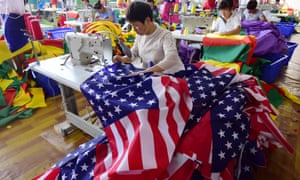Girish Menon*
Today, when we look at the world that
we live in, we find that Huawei (a Chinese technology company) is being
subjected to a systematic campaign of defamation and discrimination among the
Non-discrimination
A country should not
discriminate between its trading partners and it should not discriminate
between its own and foreign products, services or nationals.
The question this article attempts to explore is whether the WTO’s purpose is compatible with the desire of developing countries to join the ranks of the developed world.
The globalisation rhetoric dictates that countries stick to what they are already good at (theory of comparative advantage). Stated bluntly, this means that poor countries are supposed to continue with their current engagement in low-productivity activities. But their engagement in those activities is exactly what makes them poor. If they wish to leave poverty behind they have do the more difficult things that bring them higher incomes. And the WTO’s non-discrimination principle stops them from improving their earning capabilities.
Unfortunately, poor countries are not allowed to adopt such time frames for developing their industries. The non-discrimination clause of the WTO demands that poor countries compete immediately with more advanced foreign producers, leading to the demise of their domestic firms before they can acquire new capabilities.
Like any other investment, investment in capability building is fraught with risk and does not guarantee success. Some countries make it and some don’t. And even the most successful countries will bungle things in certain areas.
However, economic development without investment in enhancing productive capabilities is a near impossibility.
* Adapted and simplified by the author from Ha Joon Chang's Bad Samaritans - The Guilty Secrets of Rich Nations & The Threat to Global Prosperity
** When GD Birla died his secretary tried to get him a seat in Vaikuntha. The Dwarapalaka (gatekeeper) asked the secretary to state the reason why GD should be let into heaven.
The secretary: ‘GD is one of the biggest industrialists in
Dwarapalaka: ‘Usually that involves doing acts which are not acceptable here. This is Vaikuntha; not some unquestioning tax haven for moneybags! Please let me know what he has done in the name of God’
The secretary: ‘GD has established many Birla temples all
over
Dwarapalaka: ‘Birla is worshipped in these temples. Not good enough!’
The secretary: ‘GD is the owner of Hindustan Motors’
Dwarapalaka: ‘I am confused. How is that a case for entering heaven?’
The secretary: ‘Because whenever someone gets into an Ambassador car he says “Oh God” and whenever someone reaches her destination she says “Thank God”.
Dwarapalaka: That has definitely advanced the cause of God. Please ask him to come in’
This anecdote was first narrated by the late Sharu Rangnekar. It has been modified by the author.

